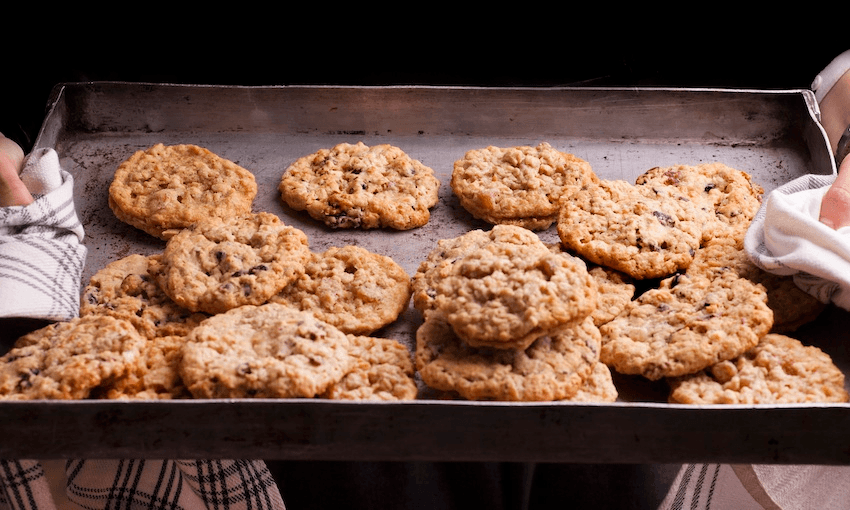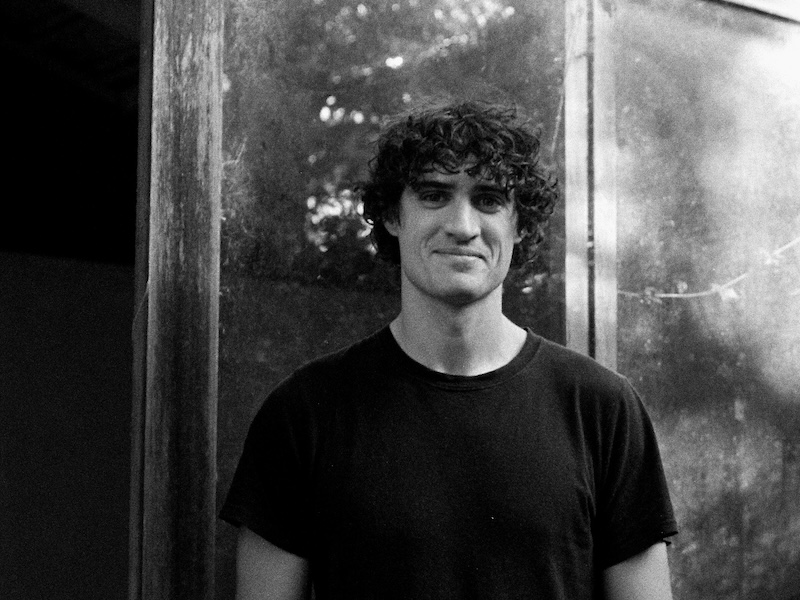Food might not quell the pain, but it gives us the strength to bear it.
This is an excerpt from our weekly food newsletter, The Boil Up.
When someone I love is hurting, the only thing I can think to do is feed them. An oily round of focaccia flecked with black sesame and red flakes of chilli. A leaking Tupperware filled with ratatouille made from the last of my summer vegetable reserves. A ceramic dish of Anna Jones’ creamy chard, lentil and bay gratin, the top studded with hunks of cheddar and a thick dusting of fresh grated nutmeg – just pop it in the oven for 25 minutes until the cheese is golden and bubbling.
I have recently been cooking for a friend who is grieving, and it has made me think deeply about need and comfort. We always need to eat, calories in so we have the energy to move and speak and cry and remember. But grief is a physical beast, one that can twist our insides, turning flavour to ash, returning nutrients as bile, or opening up a cavernous pit of aching hunger. There is a word in German, “Kummerspeck”, which literally means “grief bacon.” Figuratively, it describes the weight gained after tragedy, acknowledging the way grief often combines with physical hunger, food becoming not just a comfort but a crutch.
When I was about 19, a friend of mine died. After it happened, we gathered at someone’s parent’s house – we were so young, hardly anyone flatted yet – and tried to figure out what grieving looked like for us. Someone went and picked up Chinese takeout, big plastic containers of chop suey and sticky sweet and sour pork that smelled like stadium donuts, greasy white paper bags filled with jagged wontons, boxes of beer – so much beer. I had brought over logs of cookie dough that I slipped out to slice and bake later in the evening, when we were all feeling drunk and strange, unsure what to do at this hour and level of inebriation when we would usually go out dancing. My boyfriend had thought the cookies were a weird call when I’d insisted on making dough amidst the unreality and swirling sadness, but he and everyone else was grateful when I returned to the lounge with a sweet-scented tray of warm chocolate chip cookies. We devoured them hot, licking molten chocolate from our fingers, caramelised sugar chasing the sour taste of beer from our mouths.
A few years later, I stayed with my Nan for a couple of weeks after my grandad died. Each morning I would emerge to find evidence of some fresh pastime – perhaps the contents of my suitcase strung around the kitchen on hangers, every garment having been washed and meticulously ironed, including my knickers. On the counter, a glistening bowl of cut, peeled fruit waited for me – she’d even peeled the grapes. Nan would come in from the garden where I suspected she went whenever she heard me coming downstairs, not sure how to cope with being found amidst the fruit of her insomniac labours. We would take a French press and my skinless breakfast to the garden where we would sit and chat about the day as I ate and Nan didn’t. I was in England for the first time, surprised to find myself delighted by the food but not so distracted I didn’t notice how little Nan was eating. Determined to show me a good time despite the circumstances, she would drive us to historic houses around the countryside and, after a stroll through the gardens, I would order two cream teas at the café. “My treat,” I’d tell Nan, a generosity she couldn’t turn down from the 21-year-old granddaughter who had come halfway round the world to see her.
In her gorgeous book Home Cooking, Laurie Colwin describes a time when she was mourning her father and a friend sat her in a chair with a copy of Vogue while she busied herself in the kitchen. “When I got to the table, I realised that this angelic pal had made shepherds pie. My eyes swam with tears of gratitude. I did not know that shepherds pie was just what I wanted, but it was just what I wanted.”
Mandarins, electrolytes and yellow Squiggles tucked into a repurposed shoebox. A stack of fancy frozen meals from Ripe Deli. Showing up with a cake box full of ostentatious donuts that we ended up cutting into messy quarters to share in the sun, “no you have it, I’ve had plenty.” In times of sadness, we show love in the ways we can.
I know food doesn’t quell the pain, but it gives us the strength to bear it. After my uncle’s funeral, my boyfriend went to Shefco to buy dinner for my family: a rotisserie chicken wrapped in pita, savoury mujadara, a large size babaganoush and tub of salty Greek salad. I hadn’t even realised how hungry I was until I peeled a piece of schmaltz-soaked bread from the warm bird, saliva flooding my mouth as soon as it detected food, at last. At best, food can be healing, warming, a return to pleasure, a distraction. Even when it’s none of those things, food brought to us out of love is sustenance, filling us up in more ways than one.





















Discussion about this post